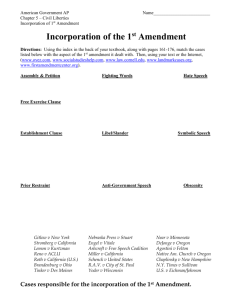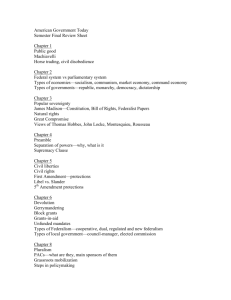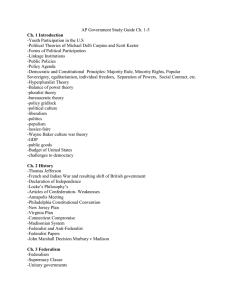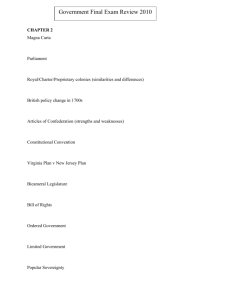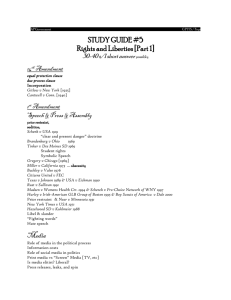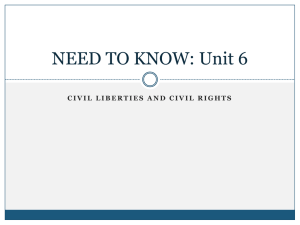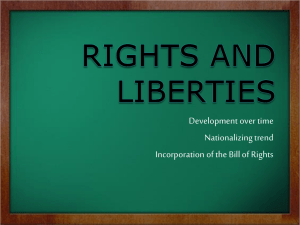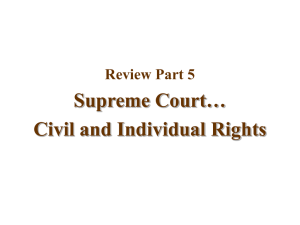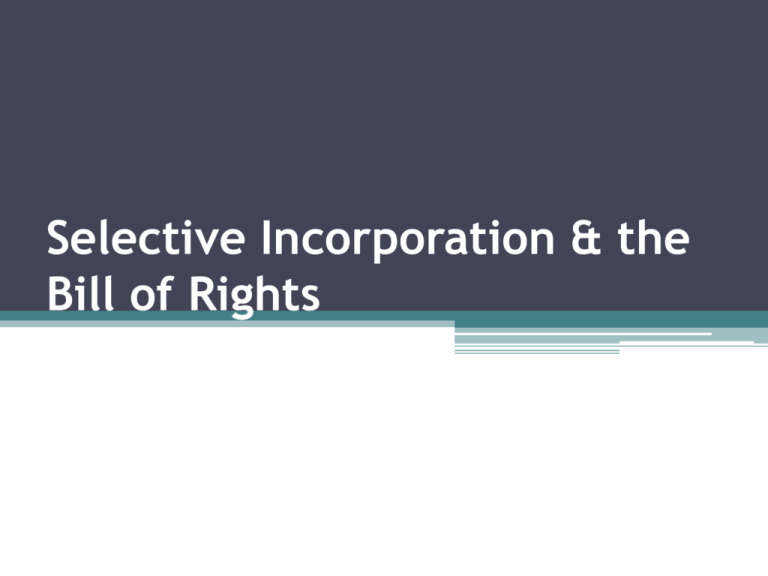
Selective Incorporation & the
Bill of Rights
“Congress shall make no law…”
• Founding Fathers fear strong national
government, NOT state government.
• Many states did have own Bill of Rights
• What type of federalism did we have during this
time period? How might that relate to the way
the states and federal BoRs were used?
-Barron v. Baltimore (1833) determined BOR
only restrained the national government
NOT the states.
Civil Rights Amendments are Passed
• “No state shall make or enforce any law which
shall abridge the privileges or immunities of
citizens of the United States nor shall any state
deprive any person of life, liberty or property,
without due process of the law…”
1925, Gitlow vs New York
• Gitlow is charged under a NY statute that made
it a crime to advocate the overthrow of the
government through force or violence.
• He sued saying:
▫ The precedent of Barron is wrong
▫ The Constitution grants Freedom of Speech that
the Court must rule on specifically
▫ Lower courts all agreed that he was correctly
charged and his guilty verdict should stand.
SCOTUS says…
• The New York law is ok (and so is the
conviction) because of the violence clause.
• However, the decision states that the 14th
Amendment means that the federal government
can enforce the Bill of Rights on states.
(overturned Barron v. Baltimore)
• This precedent is huge.
And so begins the development of
“Incorporation Doctrine”
• Court announced that freedoms of speech and
press were “fundamental personal rights &
liberties protected by the due process clause”
• Eventually, Warren Court in the 1960s applies
more and more of the BOR to the states
• What’s NOT applied? 2nd, 3rd, 7th, Grand Jury
requirement of the 5th, prohibition of excessive
fines & bail in the 8th
1st Amendment: Freedom of
Religion-- Establishment
• Establishment Clause: “Congress shall make no
law respecting an establishment of religion”
• Clause in action: Are you allowed to pray at school?
• Other issues– “Wall of Separation” between
church & state (Jefferson)
• “Creation science” vs. Darwinian theory of evolution
• Religious symbols during the holidays
1st Amendment: Religion– Free Exercise
• Provision that prohibits government from
interfering with the practice of religion
• What’s fair game? Polygamy? Drug Use?
Refusing medical treatment for your child?
Free Expression: Press
• Libel (written word) & slander (spoken
defamation)
• No prior restraint (censorship)
Free Speech
• How to uphold free speech while maintaining
public order?
• Public v. private property
• Symbolic Speech: armband (Tinker v. Des
Moines, flag-burning (Texas v. Johnson)
Free Assembly
• Right to protest, within reasonable limits (“time,
place & manner restrictions”)
• Limits on who can assemble?
▫ The right of KKK to assemble has been upheld
• When is protest harassment?
2nd Amendment: Right to Bear Arms
• Not currently part of incorporation (states may
place limits on gun ownership)
• Is this changing? Supreme court struck down
DC law banning handgun ownership
3rd Amendment: Forget About it!
+
4th, 5th, 6th Amendments: Due Process
Probable cause
Unreasonable search & seizures
• Vague terms which we need judges to continually reevaluate
• Exclusionary Rule: very controversial– no
evidence which was obtained illegally may be used
against you in court
• Other important principles: no self-incrimination,
right to counsel, right to “speedy trial”, right to jury
7th Amendment: Civil Cases
• Not important, not many federal civil cases
8th Amendment: Cruel and Unusual Punishments
No excessive fines or bail
No cruel & unusual punishment
▫ Is the death penalty cruel? Torture??
9th Amendment: “Unremunerated
Rights” 9 (Rights not specifically listed in
the constitution)
• Just because it isn’t written here doesn’t mean
it’s not your right
• Source of the implied right to privacy cited
in Roe v. Wade decision
10th Amendment:
Rights reserved to the States
• This is why we consider any topic not covered in
the Constitution to be the business of the states
• Federal government has used the Commerce
Clause (Ch. 3 Federalism) and fiscal federalism
to exert more authority over the states

